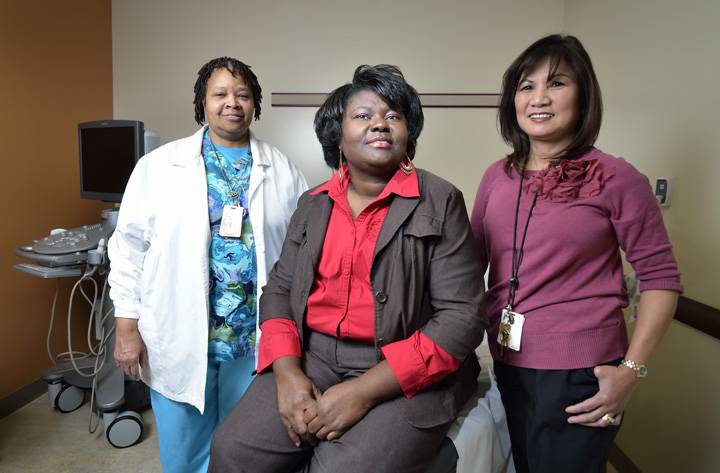”I am a two-time breast cancer survivor.”
Those are the words of Shonna Joiner, who battled two bouts of breast cancer in the matter of a few short years. Alongside Joiner through her breast cancer journey has been the team at Southwest Medical Associates’ Breast Care Program.
In May 2011, Joiner discovered a lump during a self-exam. Chantal Kavgazoff-Heki, APRN at the Breast Care Program, met with Joiner and learned that one of Joiner’s sisters had been diagnosed with breast cancer in her 40s. Although it had only been a year since her last mammogram, physician Dr. Bennett Mitchell put in a referral for another.
Paula Jordan, another APRN at the Breast Care Program explains the process from there. “When we finish the exam, patients see a technician for a mammogram, ultrasound or both, depending on a few things including their age and the clinical breast exam findings. After the radiologist reviews the patient’s history and the medical images, we let patients know the preliminary result and provide follow-up recommendations.”
Joiner received the call from Jordan. “Once I received the results, I shared the news Shonna and gave her a brief overview of next steps in her plan of care. I also let her know that our care manager would be reaching out to her to help her in any way she needed as well as follow her through her surgery.”
“They made it a personal experience,” Joiner said. “They referred me for all the necessary biopsies and tests, as well as to the surgeon’s office. Even when I needed to be referred to out-of-network care, they would reach out to the chemotherapy technicians and oncologists and keep them apprised on my condition. I could call at any time, and they provided me with the knowledge and understanding I needed to get through the process.”
That same month, Joiner was diagnosed with *“triple-negative cancer” in her left breast, a difficult form of cancer.
She had a lumpectomy in July 2011, followed by chemotherapy and radiation treatment.
“I had to endure my medical situation while working — making myself eat, being positive. People don’t like to talk about it, but you can become very depressed at diagnosis. I had to learn to be positive,” she said. “I also have other health conditions I was dealing with at the same time — diabetes, high cholesterol and high blood pressure — as well as neuropathy issues, weakness, numbness and pain in my hands and feet.”
This was compounded in May 2012 when she suffered a stroke.
Joiner says she got through it all because of her family, her friends and her faith in God.
“My faith is very important to me,” she said. “And I had the support of the breast care program. I had a really good experience with the support of Paula, Marlene and the rest of their team. Paula was great at teaching me how to do my breast self-exams and relearning my body after the surgery, along with the health improvement tips — tips on how to eat better and improve my overall health.”
Joiner’s second breast cancer diagnosis was in June 2014, this time in her right breast. This too was first detected because of Joiner’s diligent self-exams. After the first procedure, Calimlim spoke with Joiner about the need to “learn her body again.”
Jordan agrees, adding: “If you notice a change, don’t be afraid to have someone double check. The sooner you find a potential problem, the better chance for survival you have. And that is the great thing about Shonna — she did not hesitate. Even a short time after her first procedure, she was still doing a self-exam to make sure nothing was changing.”
Of the three lumps Joiner detected this second time around, two were cancerous (also triple negative). This time, she had a radical double mastectomy.
“That surgical option was one of the topics we talked about when she was diagnosed a second time,” Jordan recalled.
Later that year, more rounds of chemotherapy and radiation treatment followed this surgery.
Joiner has advice she would like to share with any woman who may be reading this or fighting a similar health battle: “Stay positive and be encouraged. Surround yourself in a positive environment and get all the information you can, and learn as much about your condition as possible. People don’t (disregard) the resources that are available. Use them! There are people to help you share this — people in your personal life, and resources like the breast care center.”
